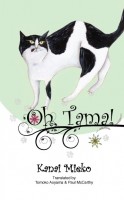 Author: Mieko Kanai
Author: Mieko Kanai
Translator: Tomoko Aoyama and Paul McCarthy
U.S. publisher: Kurodahan Press
ISBN: 9784902075670
Released: January 2014
Original release: 1987
Awards: Women’s Literature Prize
Oh, Tama! is the third volume of Mieko Kanai’s work to be translated into English. The first was The Word Book, a collection of her short stories from the 1970s, while the second was a short novel called Indian Summer. Both Oh, Tama! and Indian Summer are a part of Kanai’s Mejiro Series—a group of novels tied together more by location and characters than by an overarching plot (though some events do cross over from one novel to another.) Indian Summer is actually the third volume in that series while Oh, Tama!, even though it was translated later, is the second. Oh, Tama! was originally serialized between 1986 and 1987 before being collected and released as a single volume which went on to win Kanai the Women’s Literature Prize in 1988. The English-language translation by Tomoko Aoyama and Paul McCarthy, released by Kurodahan Press in 2014, is based on the 1999 Japanese edition of the novel. I was very pleased to receive a copy of Oh, Tama! through LibraryThing’s Early Reviewers program.
Tsuneko is pregnant. No one except for her and maybe her half-brother Alexandre (if he really is her half-brother) is entirely sure who the father is. Natsuyuki was one of the candidates, but for various reasons instead of being given the role of “father” he has had the responsibility of caring for Tama—Tusnkeo’s pet cat, also pregnant—thrust upon him by Alexandre. It’s a rather strange turn of events, especially when Tusneko leaves the country and Tama becomes one of the only remaining links to her left in Tokyo. The other potential fathers-to-be are trying to find or at least contact Tsuneko, which eventually leads them to Natsuyuki and Tama. In yet another bizarre twist of fate, one of them, Fuyuhiko, actually turns out to be Natsuyuki’s very own long-lost half-brother, making for a rather odd meeting.
There’s actually not much of a driving plot to Oh, Tama!. Instead, Kanai focuses on the mundane lives of the characters. Even the novel’s setting is unremarkable—almost the entire story takes place within the confines of Natsuyuki’s small apartment. Tama provides a focal point from which Kanai explores the interpersonal relationships between Natsuyuki, his friends, family members, and neighbors. The characters in Oh, Tama! aren’t particularly exceptional people although they’re all slightly quirky, eccentric, and offbeat. Their relationships also follow that same pattern of being just a little peculiar and unusual. I actually quite like Natsuyuki and the others and find their interactions, though fairly low-key, to be delightfully amusing as well as realistic. According to one of Kanai’s afterwords, the characters in Oh, Tama! are actually based on real people, so perhaps it shouldn’t be too surprising that their relationships, in all of their strangeness, should also feel so natural.
The translators’ introduction to Oh, Tama! describes the novel as “a treasure chest of rich and varied parody, allusion and intertextuality.” Since I haven’t actually read many of the works being alluded to, many of the references (even when pointed out) were a little lost on me. However, I could appreciate what Kanai was doing. Personally, what appealed to me most about Oh, Tama! were the characters themselves. Natsuyuki is a fairly laid back sort of guy, but this tendency (mostly because complaining or actually trying to change things would take too much effort) puts him into some odd situations. Alexandre, who seems to delight in messing with people, is often more concerned about Tama and the kittens than any of the people around him. I found their slightly antagonistic friendship and their interactions with Fuyuhiko and the others to be highly entertaining. I greatly enjoyed Oh, Tama! and its quirky, understated humor. So much so that I plan on reading the next novel in the Mejiro series, Indian Summer, in the very near future.
Thank you Kurodahan Press for providing a copy of Oh, Tama! for review.

[…] introduction to Mieko Kanai was through her short novel Oh, Tama!, the second volume in her Mejiro series. I enjoyed it so much that I wanted to read more of her […]